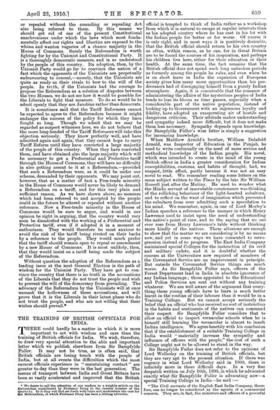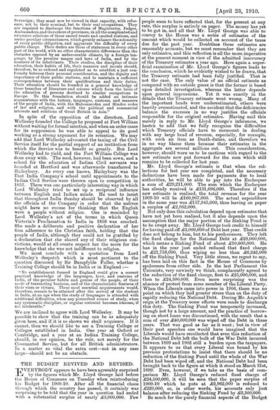THE TRAINING OF BRITISH OFFICIALS FOR INDIA.
THERE could hardly be a matter in which it is more important to act with wisdom and care than the training of British officials for India. We wish, therefore, to draw very special attention to the able and important letter which we publish elsewhere from Sir Bampfylde Fuller. It may not be true, as is often said, that British officials are losing touch with the people of India, but at all events the difficulties which the most earnest officials experience in " maintaining contact " are greater to-day than they were in the last generation. The means of transport between India and Great Britain have been so vastly accelerated and improved that the British • We desire to call the attention of our readers to a weighty article on the Referendum contributed by Professor Dicey to the current number of the Quarto' ty. In it they will find net forth with force and moderation the case for the Referendum, of which Professor Dicey has been a lifelong advocate. official is tempted to think of India rather as a workshop from which it is natural to escape at regular intervals than as his adopted country where he has cast in his lot with the Indian people for better or for worse. Of course it is only right, and in most ways it is positively desirable. that the British official should return to his own country as often, within reason, as he can, for in Great Britain are to be found the sources of his inspiration, and perhaps his children live here, either for their education or their health. At the same time, the fact remains that the British official does not spend such long unbroken periods as formerly among the people he rules, and even when he is on short leave in India the expansion of European society gives him many more opportunities than his pre- decessors had of disengaging himself from a purely Indian atmosphere. Again, it is conceivable that the romance of administering the affairs of the mysterious peoples of India tends to lose its bloom as time passes, especially when a. considerable part of the native population, instead of looking up to Government with an ingenuous loyalty and fidelity, have adopted an exasperating air of hostile and dangerous criticism. Their attitude makes understanding and sympathy indeed more difficult, but it does not make them-less necessary. Sympathy depends upon knowledge. Sir Bampfylde Fuller's wise letter is simply a suggestion for increasing knowledge.
When Matthew Arnold's brother, William Delafield Arnold, was Inspector of Education in the Punjab, he used to write continually on the need of more serious and methodical knowledge of the Indian people. His novel, which was intended to create in the mind of the young British officer in India a greater consideration for Indian susceptibilities, customs, and habits of thought, had, we suspect, little effect, partly because it was not an easy novel to read. We remember reading some letters on the same subject written to the Times by the late Sir William Russell just after the Mutiny. He used to wonder what the Hindu servant of inscrutable countenance was thinking of the rollicking behaviour of the light-hearted subaltern, and to reflect on the want of imagination which prevented. the subaltern from ever admitting such a. speculation to his mind. We remember, again, in one of Lord Morley's Indian speeches a reference to the manner in which Henry Lawrence used to insist upon the need of understanding the native's point of view, and to the saying that no one ever rose from Henry Lawrence's table without thinking more kindly of the natives. These allusions are enough to show that the matter we are considering is by no means new, and yet in some ways we have consented to retro- gression instead of to progress. The East India Company maintained special Colleges for the instruction of its civil and military cadets, and it is doubtful whether the courses at the Universities now required of members of the Covenanted Service are an improvement in principle. But outside the Covenanted Service things are much worse. As Sir Bampfylde Fuller says, officers of the Forest Department land in India in absolute ignorance of any Indian language ; those appointed. to the Educational and Police Services are sent out without any training whatever. We are well aware of the argument that every- thing these young officials have to learn is much better learnt in the routine of their labours than it would be in a Training College. But we cannot accept seriously the belief that an official who has received no sort of instruction in the habits and sentiments of the natives can command their respect. Sir Bampfylde Fuller considers that to allow an official to inspect vernacular schools when he is himself still learning the vernacular is almost to insult Indian intelligence. We agree heartily with his conclusion that if the establishment of a suitable Training College in India would. " materially increase the sympathy and influence of officers with the people," the cost of such a College, ought not to be allowed to stand. in the way. Sir Bampfylde Fuller does not refer to the opinions of Lord Wellesley on the training of British officials, but they are very apt to the present situation. If there was cogency in what Lord Wellesley said in 1800, there is infinitely more in these difficult days. In a very fine despatch written on July 10th, 1800, in which he advocated exactly what Sir Bampfylde Fuller is advocating now—a special Training College in India—he said :— "The Civil servants of the English East India Company, there- fore, can no longer be considered as the agents of a commercial concern. They are, in fact, the ministers and officers of a powerful Sovereign-; they must now be viewed in that capacity, with refer- ence, not to their nominal, but to their real occupations. They are required to discharge the functions of Magistrates, Judges, Ambassadors, and Governors of provinces, in all the complicated and extensive relations of those sacred trusts and exalted stations, and under peculiar circumstances, which greatly enhance the solemnity of every public obligation, and aggravate the difficulty of every public charge. Their duties are those of statesmen in every other part of the world, with no other characteristic differences than the obstacles opposed by an unfavourable climate, by a foreign lan- guage, by the peculiar usages and laws of India, and by the manners of its inhabitants. Their studies, the discipline of their education, their habits of life, their manners and morals should, therefore, be so ordered and regulated as to establish a just con- formity between their personal consideration, and the dignity and importance of their public stations, and to maintain a sufficient correspondence between their qualifications and their duties. Their education should be founded in a general knowledge of those branches of literature and science which form the basis of the education of persons destined to similar occupations in Europe. To this foundation should be added an intimate acquaintance with the history, languages, customs, and manners of the people of India, with the Mahommedan and Hindoo codes of law and religion, and with the political and commercial interests and relations of Great Britain in Asia."
In spite of the opposition of the directors, Lord Wellesley founded the College he proposed at Fort William without waiting for formal sanction, and when an order came for its suppression he was able to appeal to its good working as a strong argument for its retention. We may add that Lord Wellesley advocated the taxing of the Civil Service itself for the partial support of an institution from which the Service was to benefit so greatly. But Lord Wellesley had to yield, and the Fort William College was done away with. The seed, however, had been sown, and a school for the education of Indian Civil servants was founded at Hertford and was afterwards transferred to Haileybury. As every one knows, Haileybury was the East India Company's school until appointments to the Indian Civil Service were thrown open to competition in 1853. There was one particularly interesting way in which Lord Wellesley tried to set up a reciprocal influence between English and Indian minds. He used to insist that throughout India Sunday should be observed by all the officials of the Company in order that the natives might have no excuse for thinking that the English were a people without religion. One is reminded by Lord Wellesley's act of the terms in which Queen Victoria's Proclamation to India in 1858 was couched. She made a deliberate and positive declaration of her firm adherence to the Christian faith, holding that the people of India, although they could not be gratified by a declaration that she shared any of their religious con- victions, would at all events respect her the more for the knowledge that she was not indifferent to religion.
We must conclude with a quotation from Lord Wellesley's despatch which is most pertinent to the question discussed by Sir Bampfylde Fuller, whether a Training College should be in India or in England r-
" No establishment formed in England could give a correct practical knowledge of the languages, laws, and customs of India, of the peculiar habits and genius of the people, of their mode of transacting business, and of the characteristic features of their vices or virtues. These most essential acquirements would, therefore, remain to be attained after the arrival of the student in India, at an age when the study of languages is attended with additional difficulties, when any prescribed course of study, when any systematic discipline, or regular restraint becomes irksome, if not intolerable."
We are inclined to agree with Lord Wellesley. It may be possible to show that the training can be as adequately given here, and if it is so shown we shall acquiesce. If it cannot, then we should like to see a Training College or Colleges established in India. One year at Oxford or Cambridge, and a year at an Indian Training College, should, in our opinion, be the rule, not merely for the Covenanted Service, but for all British administrators. In a matter so vital the extra cost—not in any case large—should not be an obstacle.















































 Previous page
Previous page